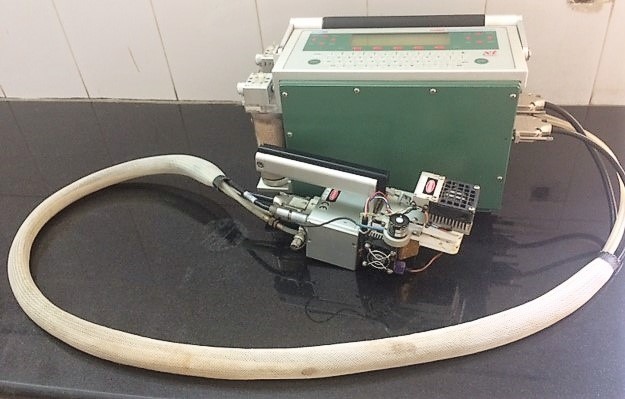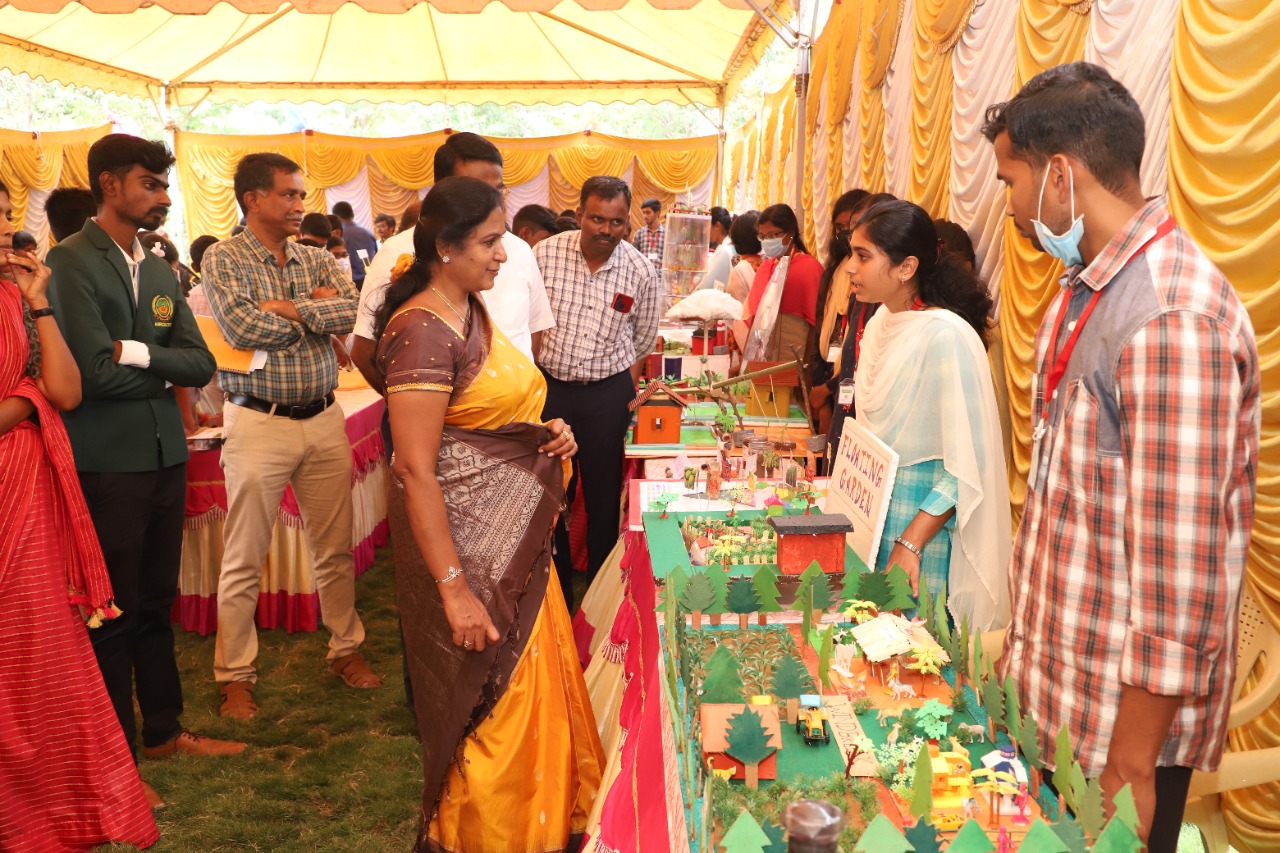The Tamil Nadu Agricultural University (TNAU) had its genesis from establishment of an Agricultural School at Saidapet, Madras, Tamil Nadu, as early as 1868 and it was later relocated at Coimbatore.
Get in touch
- info@tnau.ac.in
- 0422 6611200
- Monday to Friday: 9am to 5pm

Ph.D. in Plant Physiology
Prelude
The course provides deep insights to understand the concepts and plant responses to climate change, recent developments in photosynthetic processes, source and sink characters at molecular level. The course imparts knowledge on signalling events and associated cellular changes in plants. It also focuses on pathways and genes associated with various physiological processes and options to introgress them. The curriculum focuses on giving practical knowledge on concepts of trait introgression, trait based breeding, high throughput phenotyping to capture genetic variability, imaging tools/ techniques and root phenotyping techniques. The student will acquire knowledge and skill sets required to navigate the climate change scenarios by developing adaptation and mitigation strategies to improve crop yields. To enhance their research capabilities, the students will also learn all the theoretical and practical translational research methods of molecular breeding, transgenics and genome editing in combination with plant physiology.
Why this programme?
- Graduates of this three year Doctorate program will be imparted with the knowledge and skills in recent advances in Plant Physiology and related disciplines such as Genetics, Plant breeding, Molecular biology and “Omic” sciences to rise to the future challenges in academia, industry and policy development.
Study Programme
Recent advancement in Plant Physiology and related disciplines such as Ecology, Genetics, Breeding, Molecular biology, genomics and other “Omic” sciences made our understanding better about the plants, physiological processes and mechanisms, functional genes and their significance under changing climatic scenario. This program has been designed following the ICAR guidelines.
Application and Admission
Interested in taking part in the programme of Plant Physiology? Find out more about the specific Admission requirements and the application procedures. If you doubt whether admission is possible, feel welcome to apply online. The Admission Committee will check your admissibility.
Future Career
To replace table content
PhD in Plant Physiology course
PhD Courses After admission the students undergo a set of courses that help them understand the basics of Plant Physiology as per the Choice Based Credit System (CBCS) with a total credit load of 100 credits, of which 75 credits are exclusively earmarked for their Thesis Research. PhD’s thesis research After completing the courses in the first year, the students start their thesis research. Each student is assigned to an experienced faculty, approved by the Dean of School of Post-Graduate Studies, who would guide the student on his/ her choice of research topic. Research training The students are exposed to several scientific events like training, seminar, symposia and conferences. Many are encouraged to have training or take up a part of their research objectives at other institutes for a couple of months, either in India or abroad. |
Student Experiences

I really enjoyed all the courses. I thought it was well planned and layed out, easy for me to follow. We gained technical knowledge to improve the physiological traits using molecular approaches. Specific signaling pathway of various plant hormones and the effect of Climate Change Drivers on Physiological processes. Functional characterizations of genes and proteomics topics were quite interesting and inspired me to fix my research hypothesis in those areas. We were equipped to operate several instruments like IRGA, Fluorescence meter and osmometer etc. The work load was just enough, so we have enough time to plan our thesis research work in prior. The online class were recorded which helped me to study better. I could easily just go back and listen to that part of the class.
ARUN KUMAR
Ph.D in Plant Physiology

We have attended both online and offline classes. We had a good exposure in all courses undergone. Learnt about different metabolic pathways of plants, crop weed interaction, genome editing tools, crop ecosystem responses and mitigation strategies. We developed our presentation and communication skills during course work. I am truly impressed with how they have managed to conduct online class during pandemic days. I had a practical experience on handling fluorescence microscope, Winrhizo root image analyser and Portable Photosynthesis System and so on. I had a very good exposure in designing field experiments. Even though it is quite difficult to maintain but I learnt many things during field work. Thank you.
LAKSHMI
Ph.D in Plant Physiology
Student Alumni Experiences

TNAU has provided me a wonderful environment and opportunity to learn and grow myself academically and professionally. TNAU has helped me realize my dreams and achieve my goals. I am proud to be a TNAU ian. At the very outset I would like to express my heartiest thanks to Crop Physiologist of TNAU. I extend my warm regards to my dept, the Dept. of Crop Physiology which has immensely helped me succeed. In Dept. of Crop Physiology students gets trained to understand, manage and improve productivity, efficiency, and profit of cropping systems. Curriculum of Crop Physiology and Production Specialization provided me with needed knowledge and functional capabilities. The area of crop physiology and its study has its roots in agriculture and the study of living organisms, cell and implying into the field of farmers is an essential component. The staffs of crop physiology taught me to learn about the physical, chemical, and biological functions of crops and other organisms. Staffs are student friendly and very supportive for inculcating my ideas in research works. Well, All I can say is my love towards crop physiology and dept. of crop physiology never ends. Whenever I get opportunities to visit my dept. I jump into it and take it. I am so proud and very much humbled to be a part of Department of Crop Physiology, TNAU and presently working as Assistant Professor at PGP College of Agricultural Sciences, Namakkal. Thank you.
Dr. B. Rakavi

Crop Physiology is an important pillar of agricultural sciences, since basic study and knowledge of plant structure and functions are important for crop management and improvement. In this aspect, the Department of Crop Physiology provided me with extensive hands-on training in Plant physiology. As a Crop Physiology student at TNAU, I learned subject knowledge, research skills, critical thinking, spirit of teamwork, teaching skill, management skill, attentiveness and punctuality. I gained hands-on experience with portable photosynthetic systems, chlorophyll fluorescence meters and AAS among other things, and this experience demonstrates my uniqueness in field of Plant Physiology. The financing for research was very considerable, and we were able to readily support the acquisition of chemicals, plant hormonal analysis and anatomical examinations. I am grateful to my Department Head, Chairman and advisory committee members of my PG and Ph.D. degree, Course teachers and non-teaching staffs for shaping me into a fantastic person, Assistant Professor at SRM Institute of Science Technology, and good investigator.
Dr.P.Chandrasekaran

